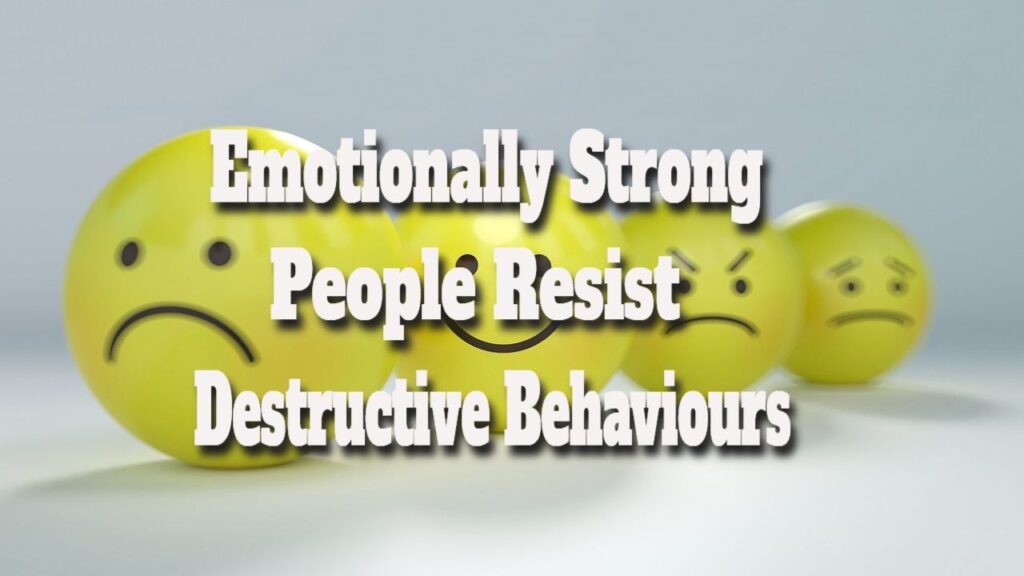Emotionally Strong People Resist Destructive Behaviours
Emotionally Strong People Resist Destructive Behaviours: Emotional strength, like courage and happiness, is not something you can acquire.
You can only aim to be emotionally stable and happy simultaneously.
This strategy frequently backfires: you strive so hard to be emotionally intense that you feel uncomfortable and uneasy!
Here’s another take on the same concept:
Less is more when it comes to emotional power.
When you become aware of and work to eliminate these destructive habits, you will experience an increase in your natural emotional power.
Reflecting on the past
Ruminating is a sort of cognition in which we repeatedly relive past mistakes or unfavourable events and replicate them, even though doing so is counterproductive.
As an example:
You lie in bed for hours, replaying your mistake during your job presentation.
You kept recalling your talk with your husband, during which he suggested you were too critical and you thought he was insensitive.
You ponder about your blunders as a father while your children were small.
But since ruminating is ineffective and makes us feel bad, why do we do it?
Because pondering “works” on the surface.
Ruminating is a type of thinking similar to problem-solving, analysis, and reflection – both beneficial and positive.
So when you contemplate, you frequently feel like you’re accomplishing something positive – you’re thinking about things, and thinking is usually beneficial.
Not at all.
Just because something is true does not guarantee that contemplating it is beneficial.
Although ruminating damages our emotional strength and well-being over time, we grow hooked on it since it feels nice in the short term.
It helps us feel capable and proactive, temporarily relieving the agony of helplessness.
This may seem clear intellectually, but it’s a fact we avoid and deny like the plague since it feels so wrong to confess.
The key to eliminating the habit of rumination and pointless self-criticism is to realise what you gain out of it and why it isn’t worth it:
Is the short-term respite from powerlessness truly worth the long-term blow to your self-esteem?
Is the fleeting feeling of “I’ll figure it out” truly worth a night of sluggishness and poor sleep the next day?
So, instead of dwelling on the past, let go of the habit of rumination and give yourself the freedom to live life forward.
Be concerned about what you cannot control.
Ruminating is the inverse of worrying.
Worrying about potential threats in the future is similar to brooding on mistakes or adverse events in the past:
You imagine yourself informing your supervisor about your error, going through many worst-case situations.
Consider all the bad, critical things your friends might say about you at the party.
Worrying about the strange discomfort in your leg, convincing yourself that it is cancer, and imagining how horrible chemotherapy will be.
We are all aware that worrying makes us feel bad: worried and agitated in the near term and lacking confidence and mental strength in the long run.
Nonetheless, we keep doing it. Why is this happening again and again?
Worry, like rumination, is essential to understand since it feels terrific in the short term! Worry provides us with the illusion of control.
Essentially, we assume that if we think long enough and plan for all conceivable adverse outcomes, everything will be fine – the people we care about will be safe, tragedies will be avoided, and so on.
Worry, on the other hand, occupies our minds. They provide us with something to do rather than simply feeling nervous, impotent, or insecure.
Worry, on the other hand, educates our brains to believe that these phantom awful things are real and likely, which keeps us worried and uncomfortable in the long run.
We all dislike the sensation of losing control. But it’s a fundamental reality that we can’t control everything, particularly the things we worry about most: the future and other people.
The key to breaking the worry habit, minimising chronic anxiety, and increasing mental resilience is to accept that you have no control.
Stop worrying about the life you don’t have and start living the one you do have.
Your mental power will increase as you practise admitting and accepting how little control you have over your life.
Maintain irrational expectations
Expectations are based on an assumption about how things should be and the assurance that reality will conform and make it so.
Example:
Expectations are a type of wish fulfilment in psychology – the momentary satisfying of a desire through an unconscious or habitual mental process.
You anticipate her being kind because you want a compassionate boss, which makes you feel suitable.
Expectations make us happy because they create the idea of stability and order.
The issue is that the world is neither safe nor orderly, particularly regarding individuals around us.
High expectations, in the long run, do more harm than good. They cause persistent irritability, strained relationships, anxiety, and, in severe cases, depression.
The trick is to recognise expectations for what they are: a primary defensive mechanism against our fragile egos and our dread of unpredictability.
You’ll be much better able to cultivate healthy ways of dealing with your anxieties and uncertainty once you’ve done that:
Instead of suppressing uncertainty and ambiguity, learn to embrace them.
I was making friends with disappointments and regrets and allowing them to happen instead of suppressing them.
You are creating sustainable income streams for your identity and self-image, so you don’t have to rely on criticism and unrealistic expectations to feed your ego.
There is no certainty.
Making excuses for your emotions
It’s pointless to judge yourself for something you can’t control, especially your sentiments.
No legal system in the world that I am aware of would imprison someone for being furious. Regardless of how angry someone is, as a culture, we only assess people for what they do – for their behaviour.
And the reason is straightforward:
It makes no sense to condemn someone for something they have no control over.
And you can’t directly control how you feel – you can’t simply turn off your melancholy or turn up your delight!
But, strangely, while we know this to be true, especially for other people, we dismiss it when it comes to ourselves:
When others are concerned, we sympathise with them, but when we are nervous about something, we convince ourselves that we are weak.
We sympathise with melancholy or bereaved friends, but we encourage ourselves to “get a grip” and quit being slackers!
That’s more than ironic:
When your friends are unhappy, you are compassionate toward them, but when you suffer emotionally, you condemn yourself!
You feel sad and humiliated if you judge yourself for being unhappy.
You are now upset and terrified if you condemn yourself for being afraid.
Originally Published On https://ahmarticles.com
The post Emotionally Strong People Resist Destructive Behaviours appeared first on https://gqcentral.co.uk












Comments are closed